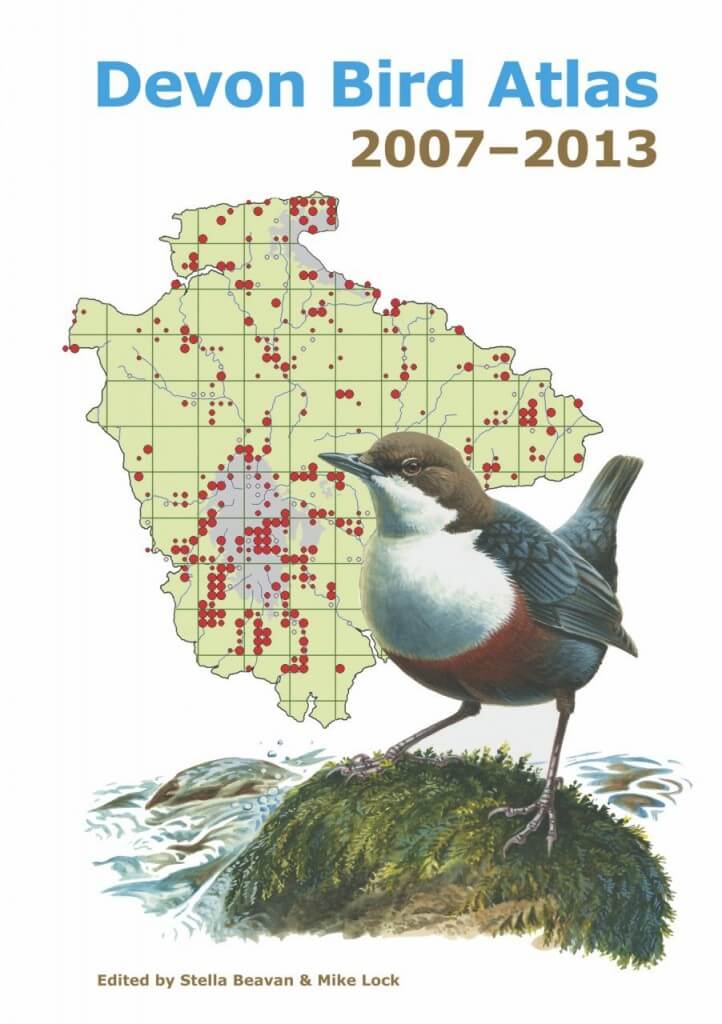I was talking in Devon on Wednesday evening – and very nice it was too!
Devon is big – big and grassy. Seen by some as a place to get through in order to cross the Tamar into Cornwall, there are reasons to stay and explore. Devon has two coasts and more coastline than most other counties as well as the whole of Dartmoor and a smallish share of Exmoor as well as lowland heath mostly to the east of Exeter. And Lundy! Throw in a few woodlands and reservoirs and you have a pretty varied, and pretty, county. But what of its birds?
This big book on a big county with a big Dipper on its cover discloses the county details of many of the national trends which we have already seen. Snipe, Turtle Dove and Grey Partridge have all declined hugely since the last (excellent) Devon tetrad atlas and are rather unlikely to feature except as sad footnotes, in the next version of this book (and despite the fact that all three are shot it is most likely that their fate is in the hands of farmers rather than shooters). Other big losers are Lapwing, Curlew and Lesser Spotted Woodpecker. Of course, there are big gainers too (though not so many) and these include Manx Shearwater, Little Egret and Dartford Warbler.
There is a Foreword where Prince Charles goes out of his way to bang on about predation and predator control – not the issue most relevant to the changes in Devon’s birds (although probably relevant to a few, to be fair). He mentions agriculture but ducks climate change and goes for the ‘importance of targetted predator control’ option instead. Huh! Our future monarch looks forward to a future ‘in which people and Nature can live together and flourish in harmony with one another’ – presumably unless they are predators in which case we should kill them off, harmoniously?
The book is an attractive thing to hold and read – but quite heavy. There are some super photographs (special mention to a brilliant Grasshopper Warbler by Paul Sterry). However, some of the maps are rather pointless as they show a huge county with hardly a dot in it – and the colours on the abundance maps are quite often close to invisible. If you think that is wrong then take a look at the Storm Petrel and Leach’s Petrel double-page spread as just one example. My copy of the book is not brilliantly bound – it gapes when at rest. the page layout is slightly odd in places – sometimes the photographs are given a lot of space and sometimes they aren’t. The layout of double page spreads is sometimes slightly eccentric making me wonder, occasionally, whether the left hand page’s maps did or didn’t refer to the species text on the right hand page. The species accounts are, frankly, often dull and a repetition of the information portrayed in the maps with a bit of speculation not based on anything to do with Devon, about the changes.
But this is a book that any Devon birder, surely, would want on their bookshelf for frequent reference. A huge amount of work went into collecting the data and this book is a landmark publication for the county. It clearly demonstrates that Devon is worth exploration and that its bird life is truly varied.
[registration_form]

Forget for a moment this wannabe monarch and all the other troubles of the countryside. Instead think what our nation is good at: train-spotting and citizen science – we invented them and this bird atlas is yet another example of why we continue to lead the world in observing nature.
Alas this has become increasingly the mass observation of absence. Where is the buzz factor in the land? Where has the singing gone? Worse than that, are such questions becoming irrelevant as the generations forget how things used to be? Are we now immersed in the ‘shifting baseline syndrome’ of complacency? A cheap nylon comfort blanket that muffles memories like those clouds of micro-moths which used to be the bane of night time driving? And anyway how stupid, those wipers are designed for clearing rain not insects.
But rest assured, the collective endeavour that goes to make up books like this will lead to a critical mass that will one day revolutionise the land. But in the meantime why on earth sup with the Prince of Emptiness and risk the corrosive and institutionalising effects of patronage and vacuous compromise?
What a strange choice of person to write the foreword, when it is suspected that he is not the biggest fan of birds of prey.
http://www.shootinguk.co.uk/news/prince-charles-speaks-out-on-predators-487
Probably more alarmingly – according to the above article he has commissioned a piece on predation by Robin Page!